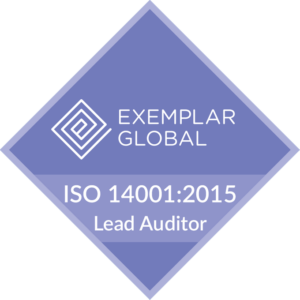ISO 14001 Lead Auditor

ISO 14001 is an international standard for environmental management systems (EMS).
It provides a framework for organizations to establish, implement, maintain, and continually improve environmental policies and practices. The goal of ISO 14001 is to help organizations reduce their environmental impact, comply with relevant environmental regulations, and demonstrate their commitment to environmental sustainability.
Key aspects of ISO 14001 include:
- Environmental Policy: Organizations are required to develop an environmental policy that outlines their commitment to environmental protection and their specific environmental objectives and targets.
- Legal and Regulatory Compliance: ISO 14001 emphasizes the importance of identifying and complying with applicable environmental laws and regulations.
- Environmental Aspects and Impacts: Organizations must identify and assess the environmental aspects and impacts of their activities, products, and services. This includes evaluating how their operations affect the environment.
- Objectives and Targets: Based on their environmental aspects and impacts, organizations set specific environmental objectives and targets. These are measurable goals aimed at reducing the organization’s environmental footprint.
- Operational Control: ISO 14001 requires organizations to establish and maintain procedures to control operations that have a significant environmental impact.
- Emergency Preparedness and Response: Organizations need to develop and implement plans and procedures to respond to environmental emergencies.
- Monitoring and Measurement: Regular monitoring and measurement of environmental performance are essential to track progress toward environmental objectives and targets.
- Management Review: Top management is responsible for reviewing the organization’s EMS to ensure its continuing suitability, adequacy, and effectiveness.
- Documentation: Like other ISO standards, ISO 14001 requires organizations to maintain documentation, including an environmental policy, procedures, records, and reports.
- Continuous Improvement: Organizations are encouraged to continually improve their environmental performance and the effectiveness of their EMS.



We are ISO 14001 Lead Auditor
Certified B4Q Exemplar Global , Certificate Number: IMS/LA/ACHF
We play a role in evaluating and improving an organization’s environmental management practices.
We help organizations meet ISO 14001 standards, minimize their environmental footprint, comply with environmental regulations, and enhance their environmental performance.
We are approuved by certification bodies, consulting firms, we work within internal audit teams in organizations seeking ISO 14001 certification or striving to improve their environmental sustainability.

Achieving ISO 14001 certification involves a structured process, which typically includes the following steps:
- Commitment: Top management must commit to implementing and maintaining an EMS.
- Environmental Policy: Develop and communicate an environmental policy that aligns with the organization’s environmental objectives.
- Environmental Aspects and Impacts Assessment: Identify and evaluate the environmental aspects and impacts of your organization’s activities, products, and services.
- Legal Compliance: Identify and ensure compliance with applicable environmental laws and regulations.
- Environmental Objectives and Targets: Set specific environmental objectives and targets based on the assessment of environmental aspects and impacts.
- Implementation and Operation: Implement the EMS, including procedures, training, and communication.
- Monitoring and Measurement: Establish and implement processes for monitoring and measuring environmental performance.
- Internal Audit: Conduct internal audits to assess the effectiveness of the EMS.
- Management Review: Top management should review the EMS to ensure its continuing suitability, adequacy, and effectiveness.
- Certification Audit: Engage a certification body to conduct an independent audit to assess compliance with ISO 14001.
- Certification: When the audit is successful, your organization can achieve ISO 14001 certification.
ISO 14001 certification is valuable for organizations seeking to reduce their environmental impact, enhance their reputation, and meet environmental sustainability goals. It demonstrates a commitment to responsible environmental management and can be a competitive advantage in the marketplace. To maintain certification, organizations must continue to improve their environmental performance and comply with the standard’s requirements.

